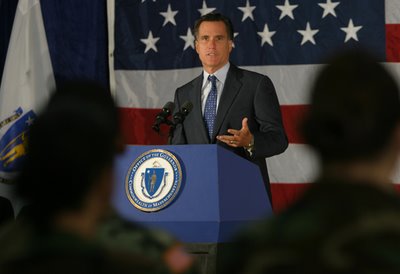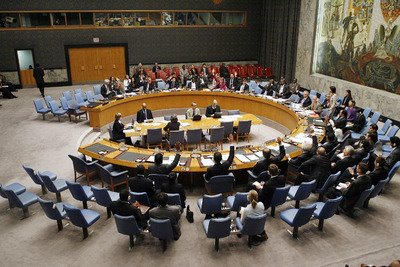
Apenas para desejar a todos vós, um Feliz Natal!
Abraço
Bruno
“Many people want the government to protect the consumer. A much more urgent problem is to protect the consumer from the government.” - Milton Friedman
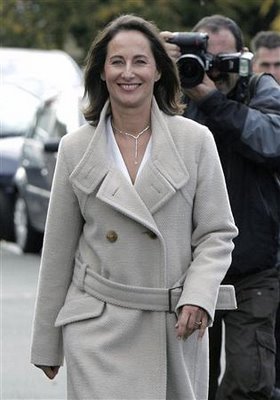
O “fenómeno Ségolène” é absolutamente extraordinário, e revelador do mundo em que vivemos. Numa terra do Norte português, um grupo de socialistas europeus reúne-se num evento cuja irrelevância é comprovada pela ausência de Zapatero ou Tony Blair, ou pela presença de Howard Dean. Ségolène, essa, está cá. E é o único assunto da reunião que merece o destaque da RTP. A senhora não disse nada, a não ser umas frases incompreensíveis até para quem fala francês. A senhora, aliás, nunca disse nada. No entanto, traz “novidade” à política. Parece que é uma “lufada de ar fresco”. Não se percebe porquê. Não se percebe, aliás, como se pode caracterizar Ségolène seja com que adjectivo for, tal a absoluta vacuidade do que ela diz e faz. No entanto, onde ela se senta, logo estão as televisões, como um gato aos pés da dona. O “fenómeno Ségolène” mostra no que se transformou a actividade política. Em publicidade. Ségolène é apresentada como “moderna”. Como “diferente”. E por assim ser apresentada, por assim ser caracterizada, passa, efectivamente, a ser “moderna”. Passa a merecer atenção, porque foi dito que merece atenção, não por ter feito algo para a merecer. Alguém disse em tempos que vender um Presidente da República era igual a vender um sabonete. O “fenómeno Ségolène” mostra que, com uma boa máquina publicitária por trás, até um sabonete pode vir a ser eleito Presidente.
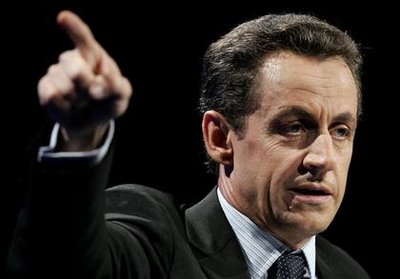
A la question "Etes-vous candidat à l'élection présidentielle ?", Nicolas Sarkozy déclare simplement : "Ma réponse est oui." Soulignant que "cette décision l'engage", le ministre-candidat, affirme qu'il s'agit du "choix d'une vie. C'est une lourde responsabilité vis-à-vis des Français auxquels je demande de me faire confiance" , ajoute-t-il.[Via Le Monde]

Parents evaluating schoolteachers' abilities and a thorough reform of boards of education will be the major pillars of education reform, according to an outline of a draft for the first report of Prime Minister Shinzo Abe's Education Rebuilding Council.
The outline, which The Yomiuri Shimbun obtained Sunday, says that if teachers are judged to be lacking in teaching abilities, retraining or changes of positions should be strictly carried out.
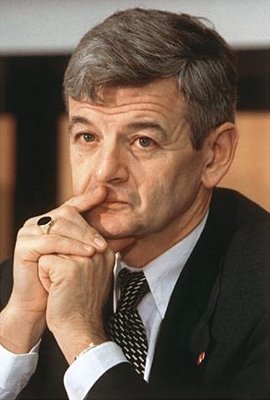
Um rapaz georgiano de oito anos arrastou hoje um autocarro de mais de duas toneladas, tendo como testemunha várias centenas de pessoas, na capital da Geórgia, Tbilisi.
O «Sansão» georgiano, de 93 quilos e 1,55 metros de altura, arrastou o autocarro ao longo de quase 43 metros perante a estupefacção dos presentes, segundo a agência oficial russa Itar-Tass.

"I also want to thank you and everyone at the Federalist Society for your commitment to the subject of this year’s conference, limited government, and to the rule of law.
I thought I would begin by sharing with you a few thoughts about last week’s election from a Republican’s point of view.
The voters obviously wanted to get our attention last week. While I would have preferred a gentler reproach than the one they delivered, I’m not discouraged nor should any of us be. Democrats had a good election night. We did not. But no defeat is permanent. And parties, just like individuals, show their character in adversity. Now, is the occasion to show ours.
The election was not an affirmation of the other party’s program. Try as hard as I could, I couldn’t find much evidence that my Democratic friends were offering anything that resembled a coherent platform or principled leadership on the critical issues that confront us today.
Nor do I believe Americans rejected our values and governing philosophy. On the contrary, I think they rejected us because they felt we had come to value our incumbency over our principles, and partisanship, from both parties, was no longer a contest of ideas, but an ever cruder and uncivil brawl over the spoils of power.
I am convinced that a majority of Americans still consider themselves conservatives or right of center. They still prefer common sense conservatism to the alternative. Americans had elected us to change government, and they rejected us because they believed government had changed us. We must spend the next two years reacquainting the public and ourselves with the reason we came to office in the first place: to serve a cause greater than our self-interest.
Common sense conservatives believe that the government that governs least governs best; that government should do only those things individuals cannot do for themselves, and do them efficiently. Much rides on that principle: the integrity of the government, our prosperity; and every American’s self-respect, which depends, as it always has, on one’s own decisions and actions, and cannot be provided as another government benefit.
Hypocrisy, my friends, is the most obvious of political sins. And the people will punish it. We were elected to reduce the size of government and enlarge the sphere of free and private initiative. We increased the size of government in the false hope that we could bribe the public into keeping us in office. And the people punished us. We lost our principles and our majority. And there is no way to recover our majority without recovering our principles first.
###
While times may change, the values and principles for which we stand do not. Your work and the mission of the Federalist Society is critical to ensuring that our nation remains faithful to the self-evident truths and enduring principles that have always made the American experiment an inspiration and example to the world.
Ideas like “limited government” or “the rule of law” can sound pretty abstract when we talk about them here in Washington in the halls of Congress. And it’s a measure of how divided our politics have become that they are often taken for partisan “buzz words.”
In fact, they are ideas worth fighting for; worth dying for. And Americans have fought and died for limited government and the rule of law for well over two hundred years, in places as close to home as Brandywine Creek and as far away as Iwo Jima, at Gettysburg and Khe Sanh, at Kandahar and at Shanksville, Pennsylvania.
So it’s important that we remind ourselves that limited government and the rule of law are more than the arid cliches of partisan political debate. In fact, they are the essential underpinnings of our freedom, and the principles for which the Federalist Society has been fighting since its formation over 25 years. To lose either would be to lose freedom, for they are our strongest bulwarks against tyranny. People are suffering today physical and emotional agony, terrible loneliness, and even death to advance those ideals in countries where the power of the state observes no limits, where human dignity is denied the respect and the protections that must form the basis of morality, in any culture, any religion, and any society.
We should never forget their sacrifice and purpose. In the name of those brave people, I want to share with you today my understanding of and support for these vital ideals.
The genius of our founding fathers wasn’t that they were better people than those who came before them; it’s that they realized precisely that they did not have a greater claim to virtue, and that the people who followed them weren’t likely to be any more virtuous than they were. That critical insight led them to realize something important about power: if its exercise isn’t limited, it will become absolute. Power always tries to expand. It’s a law of nature, of human nature.
As James Madison wrote in The Federalist No. 51, “[w]hat is government but the greatest reflection of all on human nature? If men were angels, no government would be necessary. If angels were to govern men, no internal or external controls on government would be necessary. In framing a government which is to be administered by men over men, the great difficulty lies in this: you must first enable the government to control the governed; and in the next place oblige it to control itself.”
The Founders saw the truth of this insight play out in their lifetimes, in the arbitrary exercise of power by King George III, and in the ominous rise to power of Napoleon in France. Our parents’ generation saw it in the rise of Hitler and Stalin, and in the post-war twilight struggle against communism. We’ve seen it in our generation in the reign of the Taliban in Afghanistan, of Saddam Hussein in Iraq, of Kim Jong Il in North Korea and the reign of the mullahs in Iran. We see it most starkly today in Osama bin Laden’s vision of a global medieval caliphate.
There are cultural differences in other parts of the world, to be sure, and we must adjust our tactics based on our understanding of those differences. But there are some basic underlying truths: unlimited government confers unlimited power on its leaders to impose their will on others. That’s one truth. Here’s another: people generally don’t want to live their lives in the crosshairs of government oppression. They want to be free to make for themselves and their children, by their own decisions, talents and industry, a better future than they inherited.
The solution that our founders devised guides us to this day: limited government. Understanding the natural tendency of power to expand, the founders designed our government to restrain it.
They created a federal government of enumerated powers, of three branches whose reach was limited by the powers of the other branches, by the powers reserved to the states, and by the rights reserved to individuals. They divided the power to make war between Congress and the Executive, making the President the commander-in-chief but giving Congress the power to raise and fund armies and declare war. They gave Congress the power to raise and appropriate money to support the government but the president the power to spend. They gave the President the power to negotiate treaties, but the Senate the power to ratify or reject those treaties. They gave the President the power to appoint judges, but the Senate the power of advice and consent.
They enumerated certain baseline individual rights, but instructed that this list was not exhaustive, and they provided that the rights and powers that were not enumerated were reserved strictly to the states and the people.
They created courts of limited jurisdiction, which could hear only “cases or controversies” “arising under” the Constitution. The further development of the common law we inherited from England, and the scope of the individual rights reserved to the states, were questions left to the individual states, removed from the jurisdiction of the federal courts.
By limiting government in these ways, the founders attempted to ensure that no one branch could dominate the others, that the federal government could not usurp state powers, and that one individual asserting his rights could stop the entire machinery of government from taking away his freedom.
(...)
History teaches us that without the rule of law there is nothing – no form of oppression, no form of physical suffering -- that people will not inflict upon one another. I know this to be true. I see it in the appeals I receive every day from supporters of human rights advocates around the world who have been imprisoned, tortured and murdered for daring to challenge the tyranny of their governments. I have seen it in countries such as Burma, where I have met with the woman who willingly surrendered the privileges and comforts of life in the West but has, on behalf of her people, refused to surrender voluntarily her inalienable right to freedom. And I saw it many years ago, as I watched men deprived of every liberty, who were routinely tortured, maintain their dignity and their loyalty to their country, and its ideals. That is why, I have been outspoken in opposition to using torture against our enemies. The moral strength that enables people to stand up to tyranny in other countries resides in their conviction that were the situation to be reversed they would not avail themselves of the abuses of power that they have suffered.
We, Americans stand for something in this world. We stand for a vision of human happiness and potential, of human freedom, based on limiting the powers of government and respecting the rule of law.
Those are the ideals I fought for in my youth, and that I fight for today, at less personal risk than faced by the Americans who now stand a post in foreign countries in defense of our interests and ideals. We best honor those who are fighting and dying in the deserts of Iraq and the mountains of Afghanistan by not losing our way.
We honor them by insisting in our every action, from the appointment of federal judges to the trial of enemy combatants, that our ideal of limited government under the rule of law continues to be respected.
So let’s resolve here today not to lose our way. We’re in one heck of a mess in Iraq, and the American people told us loud and clear last week that they are not happy with the course of this war. Neither am I. But let’s be clear: that’s the limit of what they told us about Iraq and the war on terrorism.
The American people didn’t tell us to forget the people we lost on 9/11, who were going about their lives free to work and dream and love, unaware that they were the intended victims of a jihad. They didn’t tell us to forget the sacrifices of our soldiers in Iraq and Afghanistan, or to choose a course that would imperil their mission.
They didn’t tell us to abandon our friends in remote parts of the world to moral monsters like Osama bin Laden or to apostles of hate like the Taliban who oppress everything they cannot understand.
Above all, they didn’t tell us to forget our ideal of limited government.
I think the American people want us to reaffirm who we are. So let’s do that today, my friends.
We are a nation that limits the reach of government because government by its nature will, if permitted, limit the reach of the human heart.
We are a nation that limits the reach of government because we understand that no government should have a right to impose itself between human beings and their lawful aspirations to make of their lives what they will.
We limit government because the greatness of our country, our productivity, resourcefulness and compassion, is not a product of the state’s decrees or prerogatives, but derived from the free exercise of the rights and responsibilities of liberty.
We are a nation that limits government so that government cannot limit us.
I believe this notion of limited government will stand as our lasting contribution to the world. We are proof that people can frame a government to serve as an instrument of the people, not the other way around.
And by our actions both at home and abroad we will prove once more, as we did in the last century, that regimes like the Nazis, or the fascists, or the Soviet Union, or the Taliban, which place the interests of the state or a movement or a cause above the rights of the people, is on the wrong side of history.
America must remain ever vigilant in the preservation of our governing ideals. You must continue your good work in service to that essential work, because you know something that we here in Washington too often forget: that neither the courts, nor Congress nor the President can make us a great country. Only the American people can do that, if we, all three branches of government, safeguard their rights, which we have sworn an oath to do.
The endless ranks of Americans who have died in service to that ideal, and who fight to defend it today, demand of us, who do not share their sacrifice, that we use our talents and industry to keep that ideal inviolate within the boundaries of the country they have loved so well.
I thank you for keeping faith with their faith, and for lending your hearts and minds to the enduring and noble cause of preserving in our time the greatest experiment in human history: government of the people, by the people and for the people.”


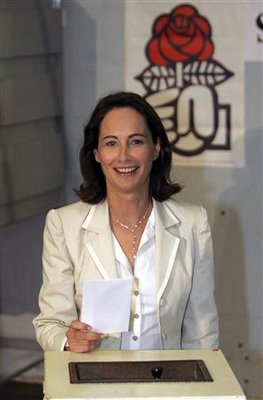
"Je vis intensément ce moment de bonheur", a déclaré Ségolène Royal. "Vous ne serez pas déçus", a-t-elle aussi dit aux militants socialistes. Rue de Solférino, au siège du PS, on estime qu'elle obtiendra entre 55 et 60 % des voix. Dominique Strauss-Kahn serait deuxième, autour de 25 à 30 %.[Le Monde]

It is now more apparent than ever that the Republican Party urgently needs strong, charismatic leadership as it licks it wounds after the 2006 elections. Consequently, there is no better choice for the 2008 Republican presidential nominee than former New York mayor Rudy Giuliani.
Most of the liberal pundit-ocracy says Sen. John McCain (R-Ariz.) is the favorite for the 2008 nomination, and that Rudy’s positions on social issues will prevent him from getting past a primary. But those people are wrong.
Giuliani consistently beats out McCain in polls of favorability, name recognition and potential voting in 2008. He almost always finishes number one or two in not only mainstream polls, but also, more importantly for the primary, in polls on conservative Web sites where Newt Gingrich and Sen. George Allen (R-Va.) are near the top. The base may disagree with some of Giuliani’s social positions, but they do like him as a person and a leader — something that cannot be said about McCain.
Two factors will turn Giuliani’s social stances into a non-issue. Giuliani isn’t a senator with a long history of established, controversial votes (but who is?); his stances are largely artifacts leftover from his days as a pragmatic mayor of a very liberal city. In a Republican primary, it will be very easy for Giuliani to move back to the center-right on social issues. Also, Giuliani has proven that he is truly a fiscal conservative, something that has become a rarity in either party.
The second issue is simpler: The 2008 election is not going to be about social issues; it’s going to be about how the United States is going to handle the continued threats from violent Islamic fundamentalists. Ever since the Sept. 11, 2001 terrorist attacks, Giuliani has proven his courage and strength in times of crisis and that he understands what is at stake for the world.
His leadership will not falter, and he is capable of correctly making tough decisions as evidenced by his refusal to accept a Saudi prince’s $10 million offer after criticizing U.S. foreign policy. Unlike the Democrats, Giuliani is not going to settle for appeasement of the terrorists.
Giuliani hasn’t officially declared his candidacy for president, but delaying his announcement is beneficial because his name recognition isn’t going to get much higher. His actions certainly convey a desire to run; his Solutions America PAC funded Republican candidates across the country. Giuliani himself appeared with candidates from Arizona to Pennsylvania and many places in-between, and he spent the final night in Iowa — home of the nation’s first presidential caucus.
Giuliani has had some personal troubles, but the Democrats don’t have any moral ground on which to stand and criticize him. Remember, if Giuliani, McCain, Gingrich, Allen and Gov. Mitt Romney (Mass.) run in a GOP primary, “the only guy in the GOP field with only one wife would be the Mormon,” said Kate O’Beirne of National Review.
Imagine this: Giuliani brings with him all of the positive aspects of the Republican Party without carrying any of its baggage. He wins New York’s 31 electoral votes versus any Democrat — including Hillary — and with a charismatic, midwestern or southern running mate, Giuliani walks into the White House with hardly a fight. 2008 presidential dropout Mark Warner (D-Va.) was the Democrats’ only long shot to stop him.
Rudy Giuliani cleaned up the city of New York and is more than able to tackle the problems facing our country today. America needs strong, charismatic leadership, and Giuliani is the man to provide it.Eric Rodawig

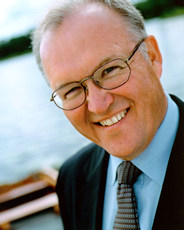

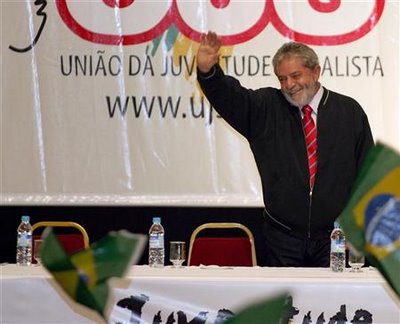
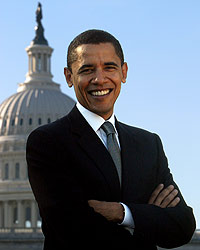
At the time, I called Sen. Kennedy "Jack." He thanked me for helping him try to get the Democratic vice presidential nomination that summer. I said, "Jack, if you are still interested, I think you can be nominated for vice president in 1960." He looked at me with his piercing eyes and replied, "Vice president? Newt, I'm going to run for president!" I was stunned, and said, "Are you nuts? You are only 39 years old." He said, "If I ever have a chance, it is next time." And, of course, he was right.
Fifty years have gone by since that dinner-party conversation. Now we have another young man thinking about running for president. Sen. Barack Obama (D-Ill.) is two years older than Kennedy was when he became president at age 43. Yet many people wonder whether Obama is ready to assume the responsibilities of the presidency. I believe he is ready, and here's why.
Our country got off to a bad start in the new century. Sept. 11, 2001, the Iraq war, Iran and North Korea working on nuclear bombs, mammoth budget deficits, failure to address problems with Social Security, health care and immigration--all these issues have engulfed our country. We are disgusted by excessive partisanship and ethical lapses in both parties.
We need a calm, reflective president who does not think the other party is driven by bad motives. His new book, "The Audacity of Hope: Thoughts on Reclaiming the American Dream," is a thoughtful, careful analysis of what needs to be done to preserve our freedoms in a time of terror. For those who question whether he has enough experience to have good judgment, I remind them that it was Obama who had the wisdom and courage back in 2003 to warn, "Do not invade Iraq." His service in the Illinois Senate and the U.S. Senate earned the respect of his colleagues on both sides of the aisle. He brings people together to find consensus and to find solutions to our problems. He is a different kind of political leader. He is a peacemaker.
Second, as David Brooks pointed out in his column in The New York Times last week, Obama is not an orthodox liberal. Obama is of a new generation, tired of the arguments about big versus small government. Instead, he wants smart government. He looks for sensible solutions either through governmental action or marketplace approaches, whichever is appropriate for the circumstances. He is the opposite of an ideologue and has no interest in continuing the current impasse between liberals and conservatives.
Third, his unique background can heal racial and ethnic tensions that persist in our pluralistic society. The reason Americans of all opinions liked his famous 2004 speech at the Democratic National Convention was that he transcended the usual problems of race and gender and ethnicity and talked about "one America," not blue or red states, but a vision of America's future faithful to our ideals and our Constitution.
Finally, I've been lucky enough to have known the senator and his wife, Michelle, for more than 15 years. Michelle and Barack worked in our law firm in the 1980s. (Indeed, that is where they met!) My wife, Jo, and I kept in close touch with the Obama family for years. To those who wonder about whether he is ready to be president, we can testify that Barack and Michelle are true grown-ups. And that is exactly what we need in the White House.
Barack, Kennedy said 50 years ago, "If I ever have a chance, it is next time." That is good advice for you.Newton N. Minow

A ofensiva contra a KSM iniciou-se no mês de Dezembro de 2005.Utilizando o pretexto de que a KSM interfere com o âmbito de actividade dos Partidos, o Ministério do Interior da República Checa enviou à KSM uma ordem que tentava obrigar esta organização a renunciar ao seu programa político, à sua identidade comunista e aos seus objectivos e à sua fundamentação teórica baseada no marxismo-leninismo.
(...)
O governo da República Checa atribuiu, assim, um prazo à KSM para alterar o seu programa, caso contrário, ameaçou ilegalizar esta organização juvenil.
Perante a enorme mobilização da juventude em solidariedade com esta organização e as repercussões que este atentado poderia ter, o governo checo mantendo a ameaça de ilegalização, adiou a sua decisão. O Governo da República Checa, em carta datada de 12 de Outubro de 2006, vem agora dissolver a KSM. De forma absurda, a única razão que o Governo apresentou para esta medida referia-se à defesa da KSM, no seu programa, da substituição da propriedade privada dos meios de produção pela propriedade colectiva dos meios de produção. E, portanto, a convicção deste jovens em construir uma sociedade diferente, não assente nos princípios do sistema capitalista.
(...)
A União da Juventude Comunista da República Checa é uma organização juvenil comunista, revolucionária, de carácter anti-imperialista, marxista-leninista, aspectos intoleráveis para a Europa do grande capital. O poder de atracção e as capacidades de transformação que os ideais do socialismo e do comunismo exercem sobre amplas massas juvenis preocupa os Governos da União Europeia. Também em Portugal, embora não tenham ido tão longe, os partidos do sistema entendem-se e aprovaram uma nova lei dos partidos e do seu financiamento que, no essencial, visa impor um modelo único partidário e destruir o PCP e as suas características. Em inúmeras situações, a intervenção e actividade de propaganda e divulgação da JCP tem sido reprimida pelas autoridades.
The Interior Ministry dissolved the Young Communists (KSM) association because its programme statement says that it wants to remove the private ownership of the means of production, ministry spokesman Majka Masarikova said.
Masarykova said this was against the Constitution and incompatible with fundamental democratic principles.
The KSM received the decision on Monday and wants to address a court on the issue. Its representatives dismissed the opinion that its programme is against Czech law and said in a written statement that political reasons were behind the ministry's decision.
The KSM recently campaigned against the possible stationing of a U.S. missile base in the Czech Republic.
The dispute between the ministry has been lasting a long time. In March, the KSM representatives changed the controversial wording of their official programme, but the ministry says the change is unsatisfactory.
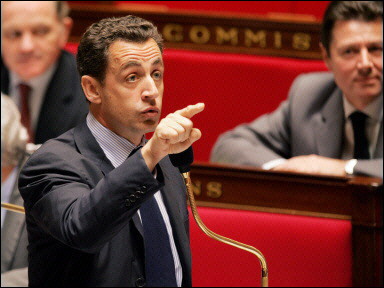
Nicolas Sarkozy:- to cut payroll and employee levies that make labour costs especially expensive in France
- a “social value added tax” to pay for social security costs instead
- loosening of 35-hour week to enable staff to work more if they choose
- obligation to perform community work for unemployment benefit
- a single labour contract to encourage hiring, replacing mix of permanent and fixed-term contracts
- finance for life-long training
- directors’ salaries to be set at AGMs
- stock options to all employees
- positive discrimination (affirmative action) for minorities in workforce

Ségolène Royal:
- to repair “injustice” inflicted on workers by dictatorship of capital markets.
- to raise incomes of lower-paid
- to make the 35-hour working week fair for all
- more flexible labour law in return for greater employment security
- compulsory trade union union membership
- penalties for companies that move production abroad
- “social harmonisation” in EU: no British opt-out on working time
- big incentives for environmental protection
- direct democracy: citizens’ “juries” to evaluate government performance
Um médico não tem direito a objeção de consciência, na medida em que é pago pelo Estado para fazer aquilo que o Estado lhe manda. Se quer ser objetor de consciência, deve declará-lo ANTES de o Estado lhe dar emprego e, nesse caso, o Estado não lhe deve dar emprego. (Um soldado também não pode declarar-se objetor de consciência só quando é mandado para a guerra.)
Concorda com a despenalização da interrupção voluntária da gravidez, se realizada, por opção da mulher, nas primeiras 10 semanas, em estabelecimento de saúde legalmente autorizado?
